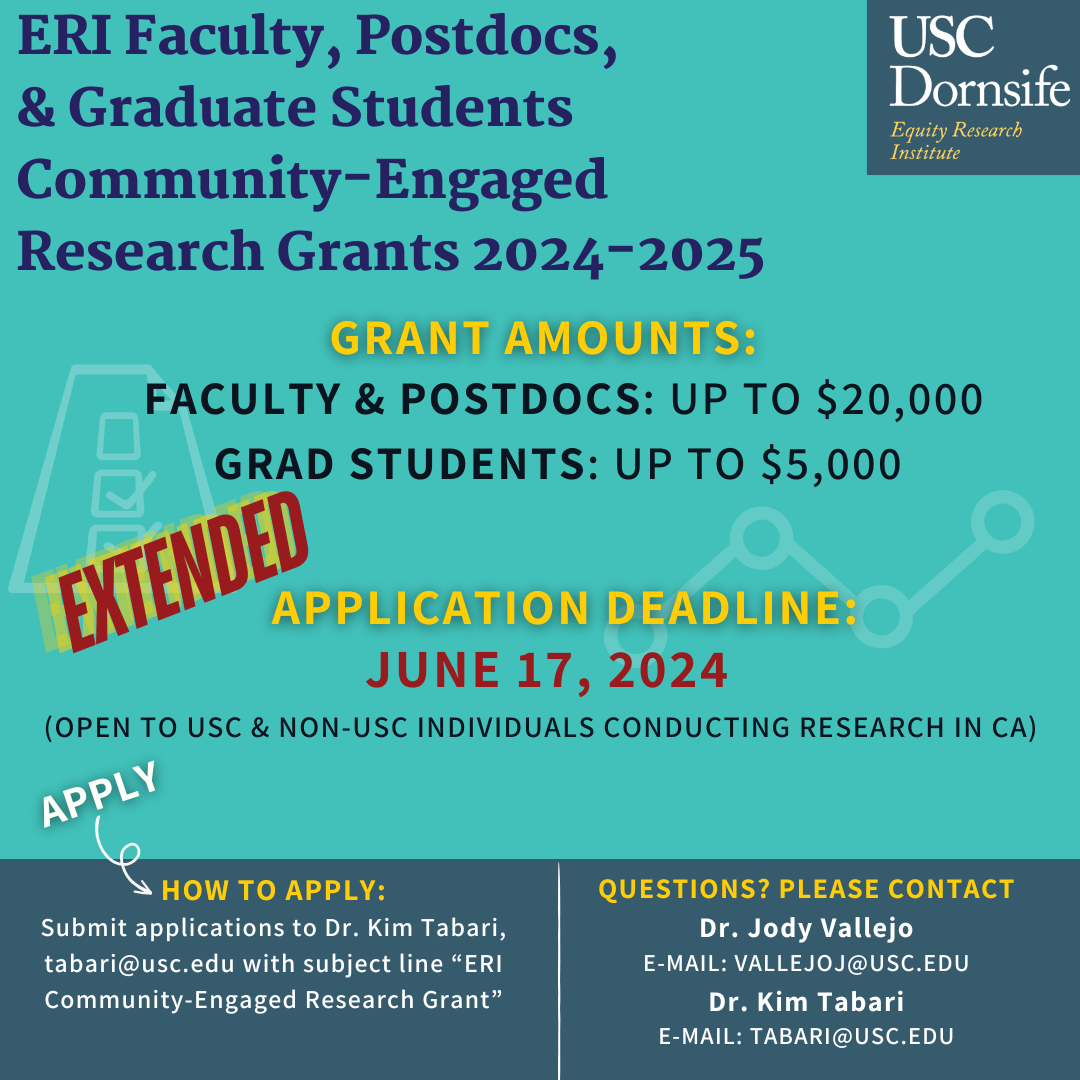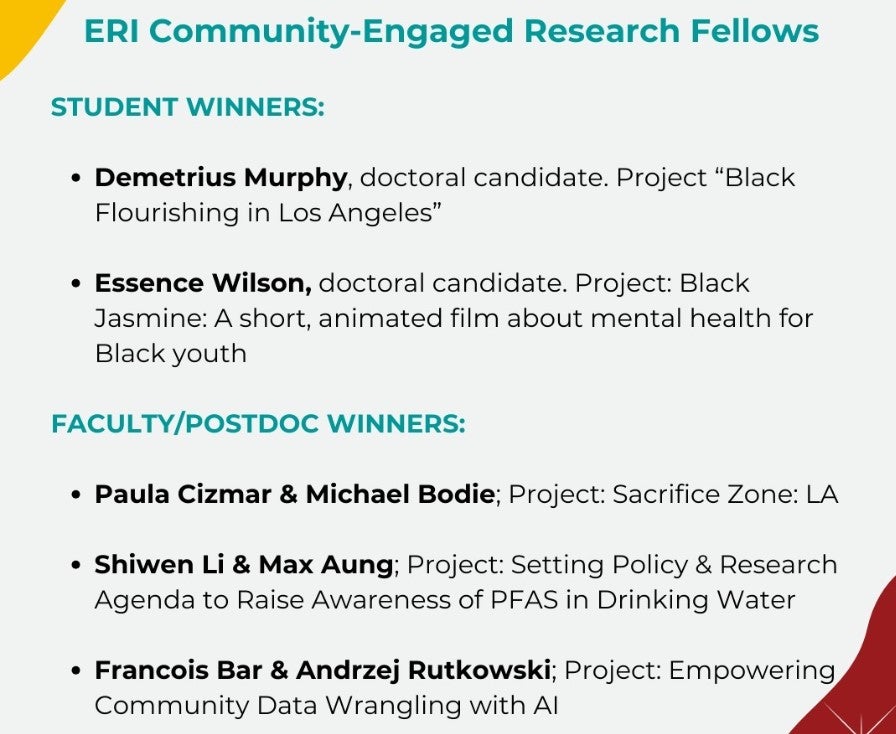
USC ERI is thrilled to announce the second year of our Faculty, Postdoctoral Scholar, & Graduate Student Community-Engaged Research Small Grant Program—an exclusive opportunity for faculty, postdoctoral scholars, and graduate students to craft their own research to power social change. This program encourages active participation in addressing real-world challenges with a particular emphasis on bolstering community power, power-building, and addressing inequities.
Key Details:
Application Deadline: June 17, 2024
Funding Duration: Project funding can be used from August 2024 – August 2025
Grant Range:
Faculty & Postdocs: Up to $20,000
Graduate Students: Up to $5,000
Application Requirements:
You’ll need to submit a concise proposal (no longer than 8 pages) that includes:
- A 200-word project summary
- Detailed project description, research methods, and significance
- Alignment with the community power building field
- Connection to your community partner’s goals
- Project timeline and expected outcomes
- References from faculty (grad students only) and community partners (all)
- Budget justification (excluding PI salaries)
- 2-pg CV
Benefits:
Awardees will be affiliated with ERI throughout the 2024-25 academic year. You’ll also have the opportunity to participate in a seminar in late Spring 2025 where you will showcase your research progress and findings. Additionally, a final narrative report is due by August 16, 2025.
How to Apply:
Submit your applications to tabari@usc.edu with the subject line “ERI Community-Engaged Research Grant” by June 17, 2024.
For any questions or clarifications, please reach out to Dr. Jody Vallejo, ERI Associate Director, vallejoj@usc.edu or Dr. Kim Tabari, ERI Organizational Development Director, tabari@usc.edu
Don’t miss out—apply for the USC ERI Community Scholar Grant today!
ERI Community-Engaged Research Grantees 2023-2024

About the 2023 student recipients
Demetrius Murphy
Doctoral Candidate
Project “Black Flourishing in Los Angeles”
Demetrius is investigating how Black people organize their lives for happiness and contentment in Los Angeles. He is interested in how Black people define and construct “the good life” via the concept of flourishing. He is examining how race, wealth, neighborhood, and other factors shape constructions of flourishing for Black people in Los Angeles. I believe that this project has great potential because it will inform multiple literatures in Sociology, including the fields of race, class mobility, stratification, class reproduction, intra-class relationships, and flourishing. In addition, this project has significant relevance for social policy that aim to remedy historical and contemporary inequalities in urban areas. The ethnographic and comparative nature of Demetrius’ research design is particularly powerful, as he is collaborating with community organizations and will compare and contrast different neighborhoods and people across social classes, which will provide insights for local level and regional policies that can facilitate flourishing. Demetrius is conducting this research in collaboration with Destination Crenshaw, a community organization engaged in Black placemaking in South Los Angeles via business, art, and community building.
Essence Wilson
Doctoral Candidate
Project: Black Jasmine: A short, animated film about mental health for Black youth
The journey to adulthood can be incredibly daunting for Black adolescents. Annually, suicide now claims the lives of Black adolescents at twice the rate as their white counterparts, with a staggering 78% increase from 2000 to 2020 related to depressive disorders. These alarming statistics are often the grim consequence of pervasive stigma and the enduring effects of structural and interpersonal racial discrimination. Despite the pressing need for and availability of mental health services, effective and targeted campaigns that acknowledge these fatal outcomes and empower Black youth to navigate their mental health climate are dangerously scarce. Over the next 12 months, we are committed to filling this void by developing an equity-inclusive program among underserved youth and young adults. Our current project endeavors involve imploring a community-engaged praxis through participatory animation to produce a short, innovative film entitled “Black Jasmine” on the mental health crisis among Black adolescents. Animation production contains numerous art-based elements conducive to career paths and community engagement methods. In the recruitment process, 5 to 7 Black teens will co-design this film alongside trained animators of diverse backgrounds and health scholars to develop this compelling animation.
About the 2023 faculty and post-doctoral candidate recipients
Shiwen Li and Max Aung
Project: Setting Policy and Research Agenda for the Health Concern of Per- and Polyfluoroalkyl Substances (PFAS) in Drinking Water through Community-Based Participatory Research Approach
The overall goal of the project is to form a working group with community members and organizations, academics, healthcare organizations, and governmental agencies, to raise awareness of the impact of PFAS on human health and potential mitigation strategies, and to co-produce an agenda for actions that can be taken in prevention, intervention, policy, and research gaps. We will leverage connections through our community partner Cynthia Babich who has a deep connection with the Del Amo community impacted by the dichlorodiphenyltrichloroethane (DDT) superfund site and also directs the Los Angeles Environmental Justice Network.
Specific goals:
A) To develop a community-centered working group on PFAS and human health involving academics and multi-sector stakeholders (community-based organizations, healthcare organizations, government agencies, advocacy groups).
B) To recruit local community leaders in LA neighborhoods with a high burden of PFAS contamination. Hypothesis 1: Forming connections between academics with multisector stakeholders will be essential for research translation and understanding the needs of the community.
C) To raise awareness, collect concerns, and identify gaps and solutions related to PFAS contamination in drinking water through a series of workshops and presentations.
D) To address priority areas in research, policy, and actions needed based on community knowledge. Hypothesis 2: Engaging key stakeholders with academics through a participatory system will better inform the future direction of research and policy needed for PFAS research.
Francois Bar and Andrzej Rutkowski
Project: Empowering Community Data Wrangling with AI
“Empowering Community Data Wrangling with AI” aims to support positive change within the Skid Row community by co-designing data visualizations and annual maps that amplify community demands and support community action. The collaboration between USC faculty, students, and the Los Angeles Community Action Network (LA CAN) will enable grassroots organizations to harness AI tools in their data gathering, analysis, and presentation efforts, empowering them to advocate for social justice, resource allocation, and policy discussions.